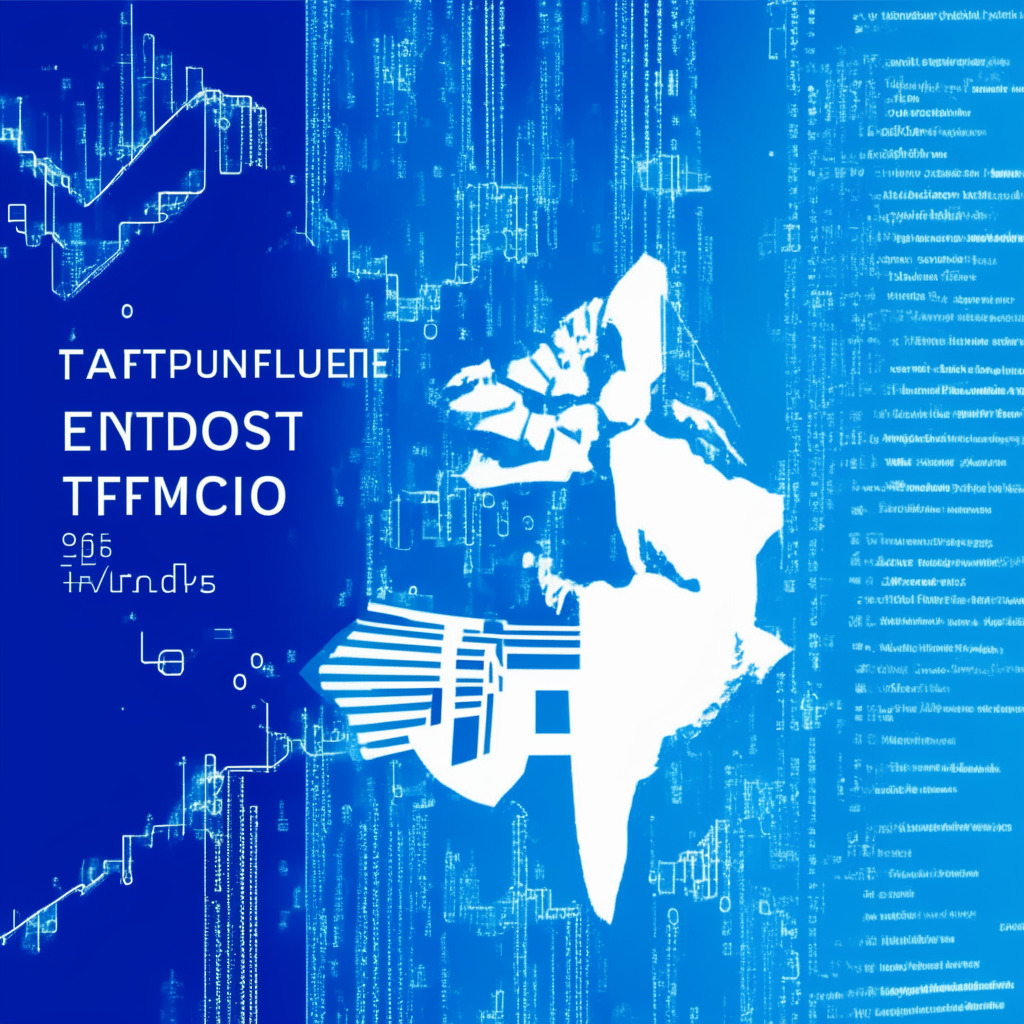The Canadian Securities Administrators’ recent clarification on stablecoin trading rules indicates that exchanges may be allowed to trade these value-referenced crypto assets if sufficient asset reserves are maintained and necessary information is disclosed. This regulatory intervention could significantly affect the crypto landscape in Canada.
Search Results for: Canada
Coinbase Halts Trading of Stablecoins Amid Tough Crypto Regulations in Canada
Coinbase, a major cryptocurrency exchange, announces the suspension of trading for three popular stablecoins in Canada starting from August 31. Despite the trading halt, the wallets will still be functional for deposits and withdrawals. However, Canada’s stern stance towards crypto service providers and stringent regulations have led to many crypto exchanges, including Binance and OKEx, pulling out from the Canadian market.
Canada’s Crypto Conundrum: The Fate of Stablecoins Amidst Surging Regulations
“Crypto exchange Coinbase is set to suspend trading of stablecoins USDT, DAI, and RAI in Canada as part of major service changes. Despite Coinbase’s recent expansion in Canada, increasing regulations have caused reconsideration of operating strategies within the country’s crypto market.”
Regulatory Ripples: The SEC’s Case against Ripple and the Future of Stablecoins in Canada
“Judge Torres’s ruling in the ongoing Ripple case might bring regulatory clarity to the crypto community. Meanwhile, Coinbase suspended certain stablecoins in Canada, raising questions on whether this regulatory rigour might affect the growth of blockchain’s future or secure the crypto future.”
Navigating Crypto Seas: Kraken’s Success Amid Canada’s Stringent Regulations
Canada’s strict crypto regulations provide clear direction for crypto businesses, says Mark Greenberg, Kraken Canada MD. Despite complexity and the resistance from major banks, these regulations have contributed to Kraken’s success and longevity in Canada.
Regulatory Clarity in Canada: Boon for Crypto Exchanges or a Bane for Small Platforms?
According to WonderFi CEO Dean Skurka, Canadian financial institutions are showing increased interest in cryptocurrencies due to unfolding regulatory clarity. Despite major exchanges exiting the Canadian market over stringent regulations, Skurka sees it beneficial for WonderFi, leading to increased activity and market consolidation.
Cross-Border Crypto Regulations: A Comparative Study between the US and Canada
“Jeremy Koven, president of CoinSmart, discusses the differential path of crypto regulations in various countries, emphasizing the clarity in Canada compared to the fragmentation in the US regulatory landscape. This perspective highlights regulatory hurdles possibly hindering US crypto growth.”
Understanding Bitcoin ETFs: Lessons from Canada’s Crypto Integration Success Story
BlackRock’s recent registration of a Bitcoin ETF reignites interest and controversy about incorporating volatile cryptocurrency into traditional finance. Reflecting on Canada’s successful integration of Bitcoin ETFs, it’s clear that ETFs carry benefits for a broader audience, beyond hardcore crypto enthusiasts. The potential of ETF security against fraudulent activities and cyber threats is significant. The surge in Bitcoin investments is tied to user-friendly mobile exchanges, suggesting investors value Bitcoin-backed financial products in the mainstream finance system.
Coinbase’s Arctic Expansion: A Warm Embrace of Canada’s Crypto Market
Coinbase is expanding its reach to Canada with new features like a month-long free use of Coinbase One and zero trading fees. Partnering with Peoples Trust Company, Coinbase now facilitates Interac e-Transfers for Canadians, making cryptocurrencies more accessible and driving up sales through meaningful interactions with customers. These significant moves align with Coinbase’s global growth ambitions and the trend of high cryptocurrency awareness in Canada.
Canada’s Crypto Conundrum: Regulatory Shifts and Coinbase Expansion
“Crypto exchange platform Coinbase expands its services in Canada, in partnership with the Peoples Trust Company. However, other crypto exchanges faced difficulties in the Canadian market due to a tightening regulatory environment set by the Canadian Securities Administrators.”
Navigating the Future: Bank of Canada’s Perspective on Central Bank Digital Currencies
The Bank of Canada’s recent report examines the potential adoption of Central Bank Digital Currencies (CBDCs), noting that Canadians currently see no compelling reason to switch from traditional forms of payment. The report suggests that the elimination of physical cash could result in the majority relying more heavily on electronic payments and might significantly impact those dependent primarily on cash transactions. Despite potential interest, the bank warns of considerable barriers to universal CBDC acceptance. The bank proposes enhancing internet access, providing low-cost banking options, and fostering collaboration with retail and financial sectors to facilitate digital payment integration, while maintaining efficiency and confidence in the cash system.
Harnessing Blockchain for Crime-Busting: Canada’s Progressive Approach and Privacy Concerns
Canadian law enforcement is utilizing the Chainalysis Reactor software to trace cryptocurrency crimes, adding a significant layer of accountability to the digital asset world. This technology reviews transaction patterns and tracks digital currencies to illegal activities, aiding investigations significantly. Despite potential criticisms of overregulation and privacy concerns, this marks noteworthy progress.
Declining Crypto Interest in Canada: Market Downturns, Regulative Uncertainty, and Future Predictions
“Cryptocurrency enthusiasm in Canada faced a considerable decline in 2022 due to factors such as regulatory uncertainty and fear of scams. The Bitcoin Omnibus Survey (BTCOS) findings indicate Bitcoin ownership fell significantly, with no significant move towards alternate cryptocurrencies, except for a surge in Dogecoin popularity.”
Impending Regulatory Overhaul in Canada: Beneficial Clarity or Complex Complications for Crypto Markets?
Canada’s financial watchdog, OSFI, proposes a regulatory overhaul of capital rules for crypto holdings, categorizing crypto assets into four distinct categories. The guidelines aim to clarify treatment of crypto-asset exposures, aligning with international standards. Critics, however, express concerns about potential complications due to ambiguities in these guidelines.
Navigating the Crypto Future: Canada’s Approach to Regulating Blockchain and Crypto Assets
“Canadian financial regulators have proposed capital plans for banks and insurers dealing with crypto assets, inspired by the Basel Committee’s suggestions. This could foster a more harmonious relationship between traditional finance and blockchain innovations, while maintaining financial stability and recognizing cryptocurrencies as legitimate financial assets.”
Navigating Uncharted Waters: Canada’s Calculated Dive into Blockchain Regulation
Canada is breaking ground towards a national blockchain strategy, aiming to boost economic and job creation opportunities while providing clear regulations for the industry. The legislative move could help integrate crypto-assets into the mainstream economy. Striking a fine balance between consumer protection and fostering innovation, lawmakers have proposed unique regulations for stablecoins and emphasized the necessity of a framework for crypto custody platforms. While there are challenges, Canada’s move could set the stage for a new era of blockchain tech.
Unmasking False Crypto Companies: Navigating Canada’s Surge in Bogus Service Providers
The Canadian crypto sector has seen a surge in companies falsely claiming authorization, with some even affiliated with counterfeit regulatory organizations. Investors should verify platform legitimacy and stick to CSA-registered trading platforms to avoid falling prey to crypto scammers.
Kraken Thrives as Competitors Exit Canada: The Changing Crypto Landscape and Regulations
Amidst tightening Canadian regulatory framework and competitor withdrawals, Kraken sees 25% growth in customer deposits and a fivefold increase in mobile app downloads. Maintaining a strong presence, Kraken ensures client asset safety and commits to third-party custodianship.
Crypto Exchanges Exit or Embrace Canada’s Regulatory Climate: Analyzing Strategies
Bybit exits the Canadian market due to recent regulatory developments, joining other exchanges like Binance, OKX, Paxos, dYdX, and Bittrex. In contrast, Coinbase, Kraken, Gemini, and Shakepay have chosen to engage with regulators and navigate the evolving crypto landscape by filing pre-registration undertakings with Canadian Securities Administrators.
Exiting Canada: Bybit’s Move Sparks Crypto Regulatory Compliance Debate
Bybit is pausing its services for Canadian users due to recent regulatory developments in the country. The Dubai-based platform will stop accepting account opening applications from Canadian nationals or residents starting May 31. As Bybit exits Canada, it expands into other markets like Kazakhstan, highlighting the increasing importance of regulatory compliance for crypto firms.
Institutional Adoption of Crypto: Canada’s Lead and Impact on Investment Strategies
The shift in perspective towards major cryptocurrencies has led institutional investors and fund managers to recognize Bitcoin as a “serious venue” for investment. Canada’s advanced regulation for crypto trading and its progressive approach towards launching crypto ETFs have attracted a wider range of investors, fostering interest in the digital asset market.
Contrasting Crypto Regulations: US vs Canada and Coinbase’s Strategic Expansion
Coinbase praises Canada’s regulatory clarity and engagement in contrast to the ambiguous U.S. regulations, which caused enforcement action against the exchange. Canada’s Pre-Registration Undertaking regime for crypto exchanges and Binance’s exit create a significant opportunity for Coinbase to strengthen its presence in the country.
Binance Exits Canada: Balancing Innovation and Regulation in Crypto Industry
Binance exits Canada due to new digital asset guidelines focusing on stablecoin and investor limits, while facing increased scrutiny from global regulators. This highlights the delicate balance between innovation and ensuring market security in the rapidly evolving world of cryptocurrencies.
Binance Exits Canada: Analyzing New Regulations and the Impact on Crypto Markets
Binance, the world’s largest crypto exchange, announced withdrawal from Canada due to new regulatory guidance on stablecoins and investor limits. This decision impacts the exchange’s operations and Canadian users, while Binance expresses interest in returning under more favorable regulations.
Binance Exits Canada: Navigating Crypto’s Complex Regulatory Landscape
Binance ceases operations in Canada amid challenging regulatory environment and stricter requirements for stablecoins and investor limits. CEO Changpeng Zhao expresses intention to collaborate with Canadian regulators for crypto regulatory framework development, while Coinbase maintains presence in the country.
US Crypto Regulation: Exploring the Timeline, Lessons from Canada, and Future Scenarios
Former SEC Counsel Coy Garrison suggests that establishing a clear regulatory framework for crypto in the US could take years. In the meantime, he points to Canada as a potential model and stresses the importance of finding the right balance between innovation and regulation to safeguard consumers and promote progress in the digital currency space.
Crypto Regulatory Developments: Dichotomy Between Innovation and Oversight
Recent news highlights the dichotomy within the crypto industry – between regulators seeking oversight and proponents advocating decentralization. Examples include the dismissal of SEC’s case against Ripple Labs, new crypto-focused task forces in Hong Kong, changes in stablecoin oversight in Canada, and increased regulation in the UK.
Digital Asset Market Boom: A Spotlight on Bitcoin, Ethereum, and Solana Amid Regulatory Uncertainty
The digital asset market recently observed a significant increase, with product inflows reaching $78 million, marking the highest rise since July. A surge was also seen in exchange-traded products, growing 37% in a week. Bitcoin experienced a notable boost, while Ethereum’s growth remains slower. Surprisingly, altcoin Solana recorded substantial outflows, yet maintains popularity. Interestingly, a majority of last week’s inflows originated from Europe due to its clearer regulatory framework.
Crypto Investment Products Surge: A Tale of Market Trends, Geographic Variances, and Selective Appetites
“Cryptocurrency investment products recorded two weeks of significant inflows, with last week totaling a robust $78 million. Crypto Exchange-Traded Products (ETPs) grew by 37%, reaching $1.1 billion. Europe shouldered 90% of crypto asset inflows, as investor appetite remained varied between different products and regions.”
Navigating the Digital Asset Frontier: Can Traditional Finance Measures Secure Cryptocurrencies?
“The director of the Consumer Financial Protection Bureau, Rohit Chopra, recently shared that the bureau is contemplating applying the Electronic Fund Transfer Act (EFTA) to digital assets. This approach could minimize high losses often experienced from unauthorized crypto transactions and aim to establish safer environment for investors.”
Canadian Securities Administrators Unveil Interim Framework for Stablecoin Issuers: Ensuring Safety or Stifling Creativity?
“The Canadian Securities Administrators (CSA) has unveiled a framework to guide exchanges and issuers of stablecoins, aiming to enhance transparency and trust. The rules require stablecoin issuers to maintain sufficient reserves with a qualified custodian and disclose crucial platform information, underscoring the need for investor information and protection.”
Cryptocurrencies: The Quest for Financial Fluidity – A Global Study by Bitget
A recent survey by Bitget revealed that 50% of crypto users invested in the sector to improve their financial skills. The study showed patterns in regional and gender-based investment strategies, with a significant portion considering cryptocurrency as a means to upgrade their lifestyle.































